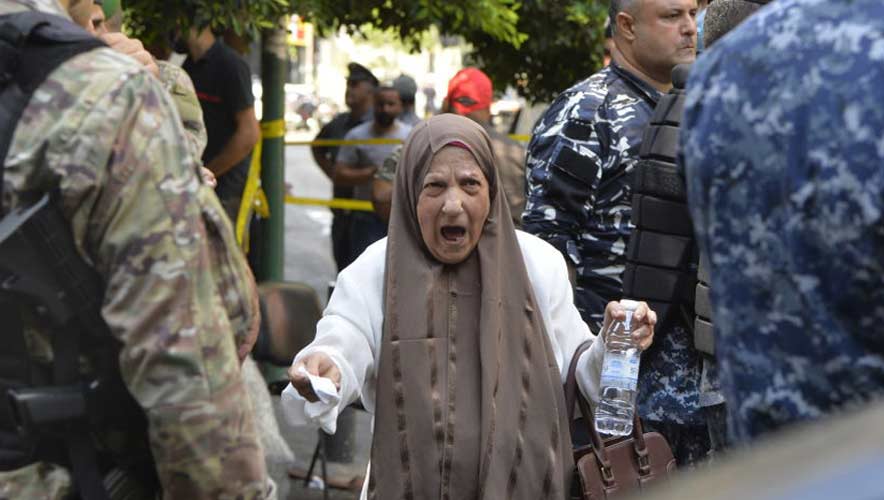Lebanese Man Holds Up Beirut Bank, Garnering Public Support
It’s not just a movie cliché. Sometimes a bank hold-up really does garner mass public support as an everyday person is seen as a hero standing up to the larger financial powers that be.
Such a moment happened yesterday in Beirut, Lebanon, when a man identified as Bassam al-Sheikh Hussein went into the Federal Bank of Lebanon with a can of gasoline and threatened to light himself on fire if the bank didn’t provide access to the money in his account—worth roughly $210,000—so he could pay his father’s medical bills.
Hussein’s move led to hours of negotiations, as he held the bank branch manager, six employees, and one customer hostage. During this time, people gathered outside to show their support for his effort to obtain his money. He ultimately negotiated the release of $35,000 from his account—much more than the $800 per month withdrawal limit to prevent a run on banks—and was arrested. No one was injured in the standoff, and a judge has ordered Hussein to remain jailed to prevent copycats.
“Because taking hostages worked to free up some of Hussein’s savings, releasing him without charges could inspire others to follow suit as people face skyrocketing inflation and a lack of job opportunities,” the Associated Press (AP) reports. “Many celebrated him as a hero, but it was not clear if his actions would lead to wider protests against banks.”
Lebanon is in the midst of a three-year economic and financial crisis, which the World Bank has said is one of the world’s worst since the 1850s.
The hostage incident “reflected a deep frustration in Lebanon over an ever-worsening economic crisis,” The Washington Post reports. “Since 2019, there have been ad hoc limits on the amount of hard currency depositors can withdraw, an effort to avoid a run on the banks and a collapse of the financial system. The policy has led to waves of nationwide protests, demanding accountability for the country’s dynastic political class and an end to endemic corruption.”
Financial institutions claim they make exceptions to Lebanon’s withdrawal limits for humanitarian cases, but Reuters reports that those exemptions are rarely implemented.
Earlier this year the World Bank issued a press release that the “deliberate depression” orchestrated by the nation’s elite in Lebanon was leading to the collapse of its basic public services. The country’s GDP declined by 10.5 percent in 2021, following a 21.4 percent reduction in 2020.
The crisis has only worsened in 2022 with the World Food Programme estimating that 46 percent of Lebanese households lack enough food to eat. Lebanon is also still largely controlled by elite families and parties engaged in a civil war that ended in 1990—despite an election in May 2022.
The World Bank has urged Lebanon’s leaders to move towards a path of economic and financial recovery by creating a new strategy that sets up a new monetary policy framework to regain confidence and stability in the exchange rate; a debt restructuring program to achieve short-term fiscal space and medium-term debt sustainability; a comprehensive restructuring of the financial sector to regain solvency; a phased, equitable fiscal adjustment to regain confidence in fiscal policy; growth enhancing reforms; and enhanced social protection.
“The government of Lebanon urgently needs to move forward with the adoption of a credible, comprehensive, and equitable macro-financial stabilization and recovery plan and accelerate its implementation if it is to avoid a complete destruction of its social and economic networks and immediately stop irreversible loss of human capital,” said Saroj Kumar Jha, World Bank Mashreq regional director, in a statement in January 2022.
In a warning to the United Nations Security Council in July 2022, Joanna Wronecka—UN special coordinator—said that Lebanon now stands at a “crossroad between rebound or collapse.” She urged political parties in Lebanon to reach a deal with the International Monetary Fund and donor countries to advance a $3 billion deal from April 2022.
The UN Security Council also received an update that Lebanon’s water infrastructure is nearing a total collapse, which when coupled with a continuing power crisis and electricity shortage is making it nearly impossible to pump sufficient water.
“While a total collapse of public water supply networks has so far been averted, the crisis has not been resolved and millions of people are affected by the limited availability of clean and safe water,” according to Edouard Beigbeder, UNICEF representative in Lebanon.
Security experts have also said they are concerned about the number of refugees and displaced people in Lebanon—many from Syria who have fled civil war and thousands from Palestine—which could be exacerbating internal tensions. On Monday, a Palestinian security official—Said Alaadin—was killed in a refugee camp in southern Lebanon following a truce between Israel and Palestinian militants in Gaza.
